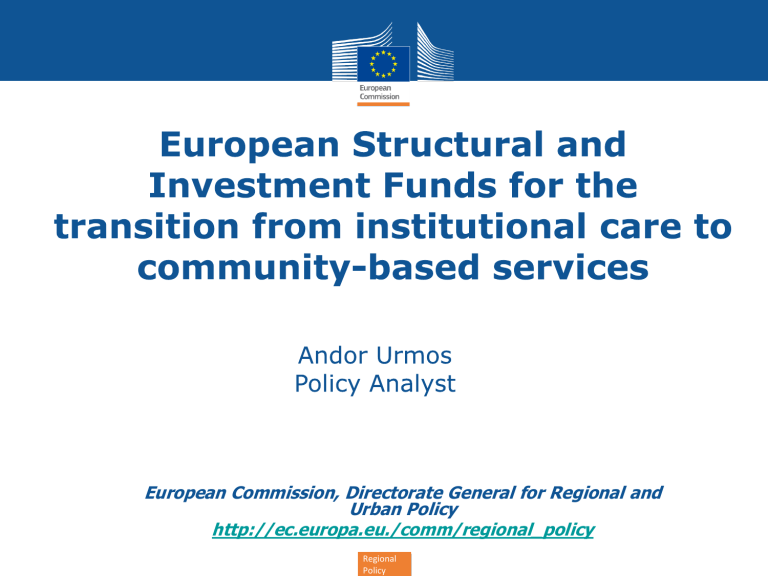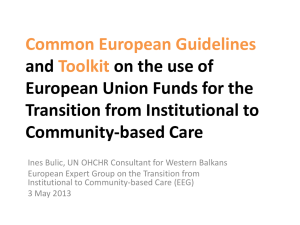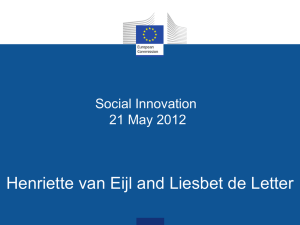European Commission, Directorate General for Regional and Urban Policy Regional

European Commission, Directorate General for Regional and
Urban Policy http://ec.europa.eu./comm/regional_policy
Regional
Policy
Future Cohesion Policy: less budget!
(eligibility simulation based on data available until 2011)
GDP/capita* < 75% of EU average 75-90% > 90%
*index EU27=100
3 categories of regions
Less developed regions
Transition regions
More developed regions
Canarias
Guyane
Réunion
Guadeloupe/
Martinique
Madeira
Açores
Malta
Regional GDP figures: 2006-07-08
GNI figures: 2007-08-09
© EuroGeographics Association for the administrative boundaries
Regional
Policy
Current programming period 2007-
2013
• Social infrastructures: education-, health-, childcare-, housing infrastructure (17,9 billion EUR)
• E-inclusion (infrastructures & e-services, including e-health)
(5,3 billion EUR)
Shift to the community-based care
• Concerns raised by the current investments in instituions
• RO – refurbishment of disability, mental health institutions
• BG – small group homes for 12-14 children
• HU – institutions up to 50 people
Regional
Policy
Informal dialog 2014-2020
• Draft regulations (October 2011)
• Danish presidency conclusions (April 2012)
• Position papers (October, November 2012)
• Trilogue (EP, EU Commission, EU Council)
• Irish presidency conclusions
• Bilateral informal dialogs
• Approval of the regulations – October 2013 (?)
Regional
Policy
Draft ESIF regulatory package 2014-2020
• Common provisions regulation
• Article 7: "The Member States and the Commission shall take appropriate steps to prevent any discrimination based on sex, racial or ethnic origin, religion or belief, disability, age or sexual orientation during the preparation and implementation of programmes."
• Thematic Objective 9: “Promoting social inclusion and combating poverty”
• Ex-ante conditionalities:
Thematic ex-ante conditionality: National poverty reduction strategy
• "……..includes measures for the shift from residential to community based care"
TAKEN OUT BY THE DANISH PRESIDENCY!
Regional
Policy
Draft ESIF regulatory package
2014-2020
Common provisions regulation
• General ex-ante conditionality: existence of a mechanism which ensures effective implementation and application of the UN
Convention on the rights of persons with disabilities
TAKEN OUT BY THE DANISH PRESIDENCY!
Regional
Policy
Draft ESIF regulatory package 2014-2020
Ex-ante conditionality
• Conditions to be fulfilled prior to submission of Partnership
Contracts and operational programmes
• Directly related to the thematic objectives or horizontal conditions of effectiveness
• Specified criteria for fulfilment defined in annex IV of CPR
• Conditionalities must be fulfilled within two years of the approval of the Partnership Agreement or by end of 2016
• Non-fulfilment of conditionalities at the time of the adoption of the programmes or by the deadline outlined above constitutes a basis for suspension of payments
Regional
Policy
Draft regulatory package 2014-2020
• ESF regulation
• Preamble: the ESF should promote the transition from institutional to community-based care
• Article 8: ………facilitating the transition from institutional to community-based care
ERDF regulation, Investment priority
• Article 5: (a) investing in health and social infrastructure which contribute to national, regional and local development, reducing inequalities in terms of health status, and transition from institutional to community-based services;
Regional
Policy
The Common Strategic Framework
2014-2020
ERDF key actions:
• “targeted infrastructure investments to support the shift from institutional to community based care, which enhances access to independent living in the community with high-quality services”
• “support infrastructure investments in childcare, elderly care and longterm care”.
General implementation principles: the CSF funds may not be used for actions contributing to any form of segregation and discrimination.
Further key actions included under other thematic objectives
(education, enhancing institutional capacity) can be complementary to the implementation of deinstitutionalisation measures.
Regional
Policy
Regulatory package 2014-2020
Reinforcing Integrated Programming
• Integrated programme approach
• The Common Strategic Framework at EU level and the
Partnership Contract at national level covering all the
CSF Funds
• Possibility for Member States to prepare and implement multifund programmes combining ERDF, ESF and the
Cohesion Fund
Regional
Policy
Position papers
Reinforcing the shift to community based care
• Health infrastructure
• PL, RO, BG, PT, HU, EE, LV, AT, SI, LI
• Reform is a condition for further financing (BG, SK)
• Childcare infrastructure
• BG, RO, CZ, SK, GR, IT, AT
Position paper - Romania
"Support the transition from institutional to community-based care services for children, people with disabilities and mental health problems and the elderly, including targeted infrastructure investment."
Regional
Policy
Management of the European Structural and
Investments funds
Programming - involves negotiations between the European
Commission and the Member States’ national and regional authorities on the planning documents for a period of seven years;
Implementation - consists of the allocation and spending of the funds, normally through the selection and execution of projects;
Monitoring and evaluation - run in parallel with the first two stages, with the aim to ensure their quality, effectiveness and consistency
Regional
Policy
Programming – Partnership Agreement
• Problem analysis – Article 14 (a) (i)
• Identification of the underlying causes of institutionalisation such as poverty, lack of services in the community, etc.
• Expected results – Article 14 (a) (iii)
• Development of community-based alternatives to institutional care should be included as one of the main results expected for the objective “promoting social inclusion and combating poverty”
• Fulfilment of ex ante conditionalities – Article 14 (d) (ii)
• National strategy for poverty reduction, which should include measures for the shift from residential to community-based care.
• General conditionality about the existence of a mechanism which ensures effective implementation and application of the UN Convention on the Rights of Persons with
Disabilities
• Involvement of partners – Article 87 2 (e) (iii)
• “actions taken to involve the partners in the preparation of the operational programme, and the role of the partners in the implementation, monitoring and evaluation of the operational programme”.
Regional
Policy
Trilogue (EP, EU COM, EU Council)
• CPR, ex-ante conditionalities
• EP, EU COM strong support, EU Council objects
• Political trilogue (Commissioners, MEPs, Ministers)
• ESF, ERDF regulations
• No significant objections on the relevant investment priorities
• Further decision on the 25% share of ESF, and 20% for social inclusion
• Common Strategic Framework (CSF)
• No delegated act!
• Thematic guidance on social inclusion, including DI
Regional
Policy
Bilateral informal dialog
• Reaction to the position papers
• Priority setting by Member States
• First draft of the Partnership Agreement
• Deadline: 18 June
• First draft of the Operational Programmes
Issues raised already:
• RO, BG, HU, SK, CZ, LI, LV, EE, PL, IT….
• Lack of relevant data on institutionalisation
• No particular attention to reform of health, social services (i.e. still strong focus on hospital-centric models)
• Cost-benefit aspect of the transition
• Link to labour market integration is missing
Regional
Policy
Guidance on the use of ESIF for transition to community-based services
• Ex-ante conditionality guidance
• Including all DI-related deleted measures
• Under discussion with the Member States
• PA and OP templates
• Reference to poverty reduction strategy, and further references to specific DI measures, if approved
• Thematic guidance on social inclusion
• Guidance on the Social Investment Package
• Sperate thematic fiches on DI, Roma inclusion, health, etc.
Regional
Policy
Social investment package
(February 2013)
• Communication “Towards Social Investment for Growth and Cohesion – including implementing the European
Social Fund 2014-2020”
• ….."There is a need to reinforce the modernisation of social policies to optimise their effectiveness and efficiency, and the way they are financed. It is essential to ensure the best use of existing resources….."
Regional
Policy
Social Investment Package
(February, 2013)
Staff Working Document – Investing in health
European financial instruments for investing in health
• investing in health infrastructure that fosters a transformational change in the health system, in particular reinforcing the shift from a hospital- centred model to community-based care and integrated services;
• improving access to affordable, sustainable and high-quality healthcare, in particular with a view to reducing health inequalities between regions and giving disadvantaged groups and marginalised communities better access to healthcare;
• supporting the adaptation, up-skilling and life-long learning of the health workforce;
• fostering active, healthy ageing to promote employability and employment
Policy
Thank you for your attention!
For more information
InfoRegio: ec.europa.eu/inforegio
RegioNetwork: www.regionetwork2020.eu
Regional
Policy





